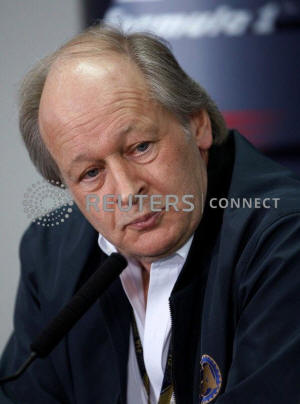FIA warns championships against
post-pandemic 'turf wars'
 Send a link to a friend
Send a link to a friend
 [May 02, 2020]
By Alan Baldwin [May 02, 2020]
By Alan Baldwin
LONDON (Reuters) - Motor racing's world
governing body has warned its various championships against waging
'turf wars' in rearranging their calendars once the COVID-19
pandemic subsides.
Formula One, the world rally and endurance championships and a
swathe of other national and continental series are on hold and
looking at cramming races into the second half of the year to
complete their seasons.
That could lead to overlap and television scheduling clashes.
"It’s crucial that we prioritise the staging of events,"
International Automobile Federation (FIA) deputy president for sport
Graham Stoker said in the latest edition of the body's journal AUTO.
"What would be counter-productive would be to get involved in turf
wars. Let’s not get involved in disputes about who has got which
slot and what prior agreements might specify -- that approach will
not work.
"The main priority is (to) get motor sport going again and if that
means some ‘super weekends’ with multiple events happening, in
co-operation and with flexibility, well, why not?," added the
Briton.

Formula One has yet to start a season that had been due to get under
way in Australia on March 15.
It is hoping to schedule 15-18 races between July and December,
starting in Austria and ending in Abu Dhabi.
It has also cancelled the traditional three-week August factory
shutdown to reschedule a string of postponed grands prix.
The Le Mans 24 Hours endurance race, which attracted a crowd of
252,000 last year to the French circuit, has been postponed from
June 13-14 to Sept. 19-20 -- a weekend which does not currently
clash with F1.
[to top of second column] |

FIA Deputy President for Sport Graham Stoker speaks at a media
conference ahead of the Bahrain F1 Grand Prix at Sakhir circuit in
Manama March 12, 2010. REUTERS/Caren Firouz

Stoker said it was important to get grassroots events, "the
lifeblood of competition", and national series up and running to
rebuild confidence.
He said the re-emergence of motorsport after both World Wars was
driven by a grassroots desire to compete and it may be necessary to
start from the bottom up again in a difficult financial landscape
with carmakers suffering a slump in sales.
"Motor sport has got to pull together, and we’ve got to have
flexibility in terms of events and venues and thinking outside the
box in order to get things going again in a spectacular way that
will obviously attract public interest," said Stoker.
"We should also demonstrate that motor sport remains relevant and a
positive influence, through its messaging and actions."
(Reporting by Alan Baldwin, editing by Ken Ferris)
[© 2020 Thomson Reuters. All rights
reserved.] Copyright 2020 Reuters. All rights reserved. This material may not be published,
broadcast, rewritten or redistributed.
Thompson Reuters is solely responsible for this content.
 |